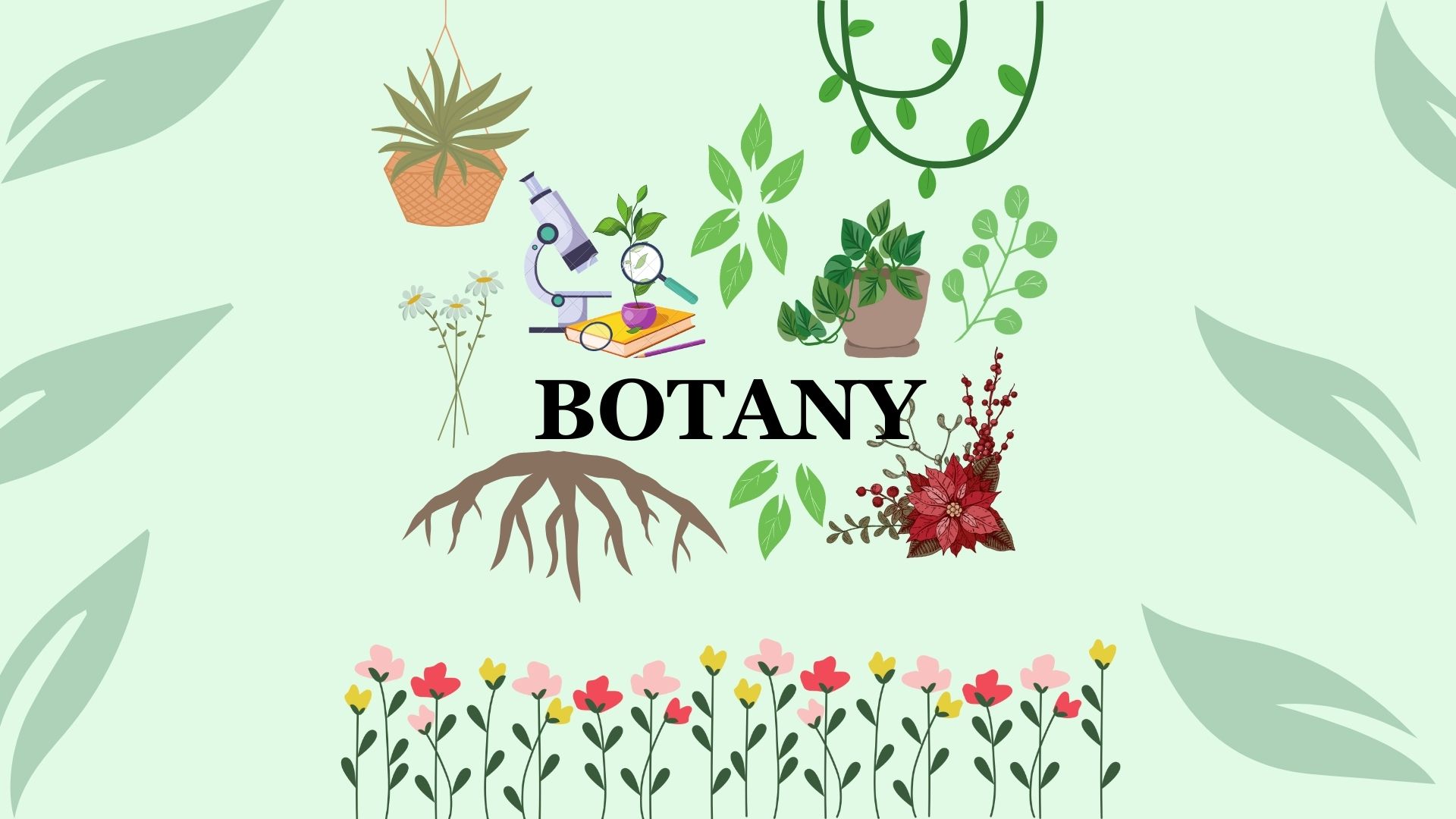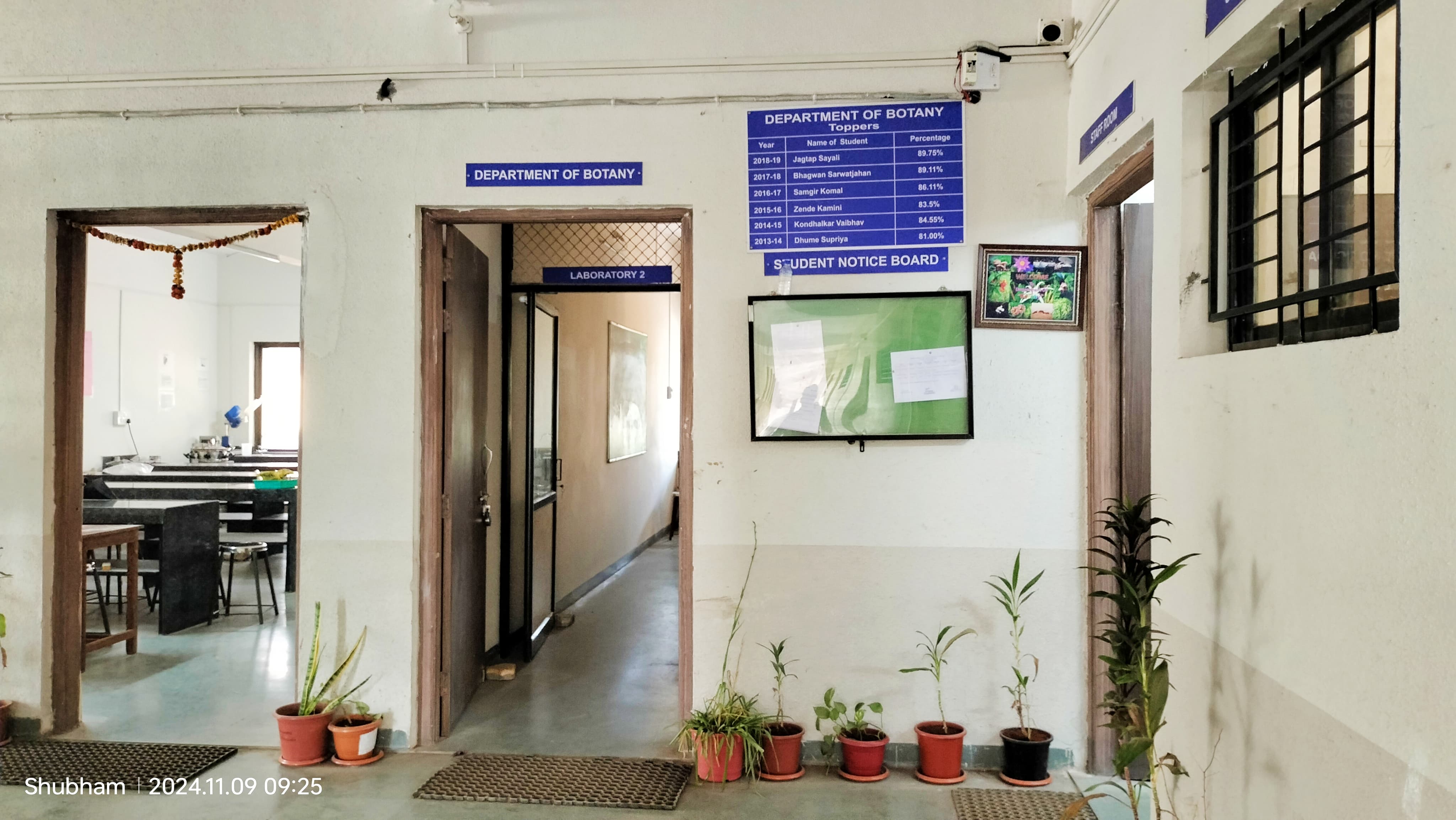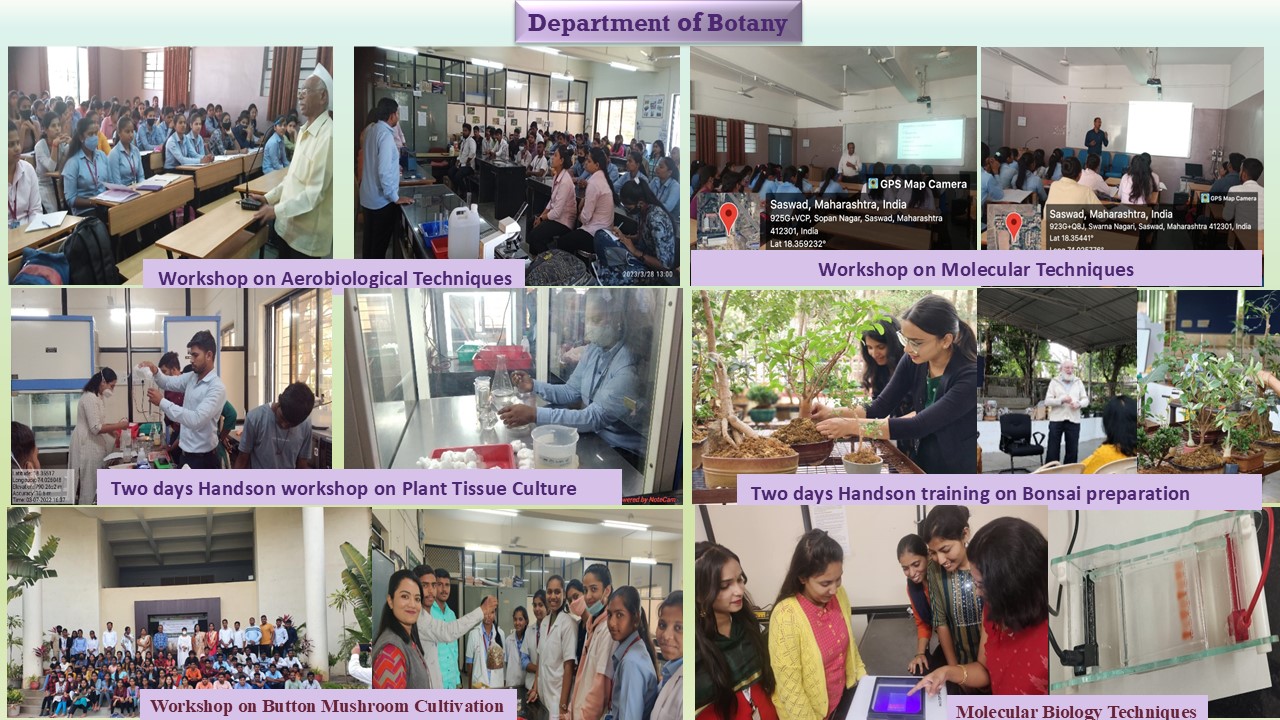Welcome To Botany Department

'Department of Botany'

'Department of Botany'

'Department of Botany'
About the Department
"We build strong foundations in universal concepts of Botany that lead to understanding of a broad range of specialized topics in Botany and focusing on complete student development as a whole.”
The Department of Botany at PDEA’s Waghire College of Arts, Commerce, and Science, Saswad, has been committed to excellence in education and research since its establishment in 1984. Rooted in a mission to build a strong foundation in universal concepts of Botany, the department fosters the understanding of specialized topics while emphasizing holistic student development.
Courses Offered:
|
Regular Courses |
|
|
1. |
B.Sc. Botany (Started in 1990) Syllabus Link |
|
2. |
M.Sc. Botany (Introduced in 2022) Syllabus Link |
|
Short-Term Courses |
|
|
1. |
Certificate Course in Basic Gardening Techniques (Since 2018) |
|
2. |
Beginners Course in Horticulture, Nursery Management and Landscape Designing (Since 2022) |
|
3. |
Certificate Course in Herbal Cosmetics and Perfume Making (Since 2023) |
Vision:
‘To advance knowledge, foster innovation, and cultivate awareness in plant sciences, empowering students and researchers to address global challenges in biodiversity conservation, sustainable resource management, climate resilience. We aim to be a leader in botanical research and education, inspiring future generations to appreciate, preserve, and harness the plant kingdom's potential for the well-being of humanity and the environment.’
Mission:
Teaching students the basics of plant science, its related components, and the latest advancements
Developing students' scientific attitude, critical thinking, and curiosity
Conducting innovative research to advance the knowledge of plant sciences
Contributing to the national goals of promoting knowledge society and serving the needs of society
Preparing students for the future: Preparing students for lifelong learning and careers in academic and research institutions
Developing students' ability to apply their knowledge in the fields of life
Establishing linkages with national and international institutes to improve student outcomes
Research and Core Areas of Expertise
- Plant Anatomy
- Plant Breeding
- Cytogenetics
- Molecular Biology
- Plant Ecology
- Plant Taxonomy
Modern Teaching Methods and Facilities
The department integrates Information and Communication Technology (ICT) tools in its teaching practices. This includes using an Interactive Intelligent Panel (65”), PowerPoint presentations, and OHP slides. Additionally:
- Small-group research projects are assigned to develop subject interest.
- Remedial coaching is offered to assist weaker students with regular assignments and periodic tests.
- A question bank is provided to help students with exam preparation.
The department also maintains a botanical garden with over 100 plant species, offering hands-on learning opportunities.
Co-Curricular Activities
To complement classroom learning, the department organizes a variety of field-based activities:
- Botanical excursions and collection trips in the nearby Purandar region and Western Ghats to study plant diversity, vegetation types, and soil types.
- Industrial and research lab visits to expose students to real-world applications of Botany.
- Guest lectures by national and international experts to broaden students' understanding of the subject.
Students are encouraged to participate in study excursion visits, inter-collegiate competitions, exhibitions, and other academic events to enhance their personal and professional growth.
"34 Years of Excellence and Beyond"
As the department celebrates 34 years of academic success, it continues to adapt to scientific advancements and evolve with modern educational techniques. With the launch of the M.Sc. Botany program in 2022, the department is set to become a centre of excellence in Botany, offering students the opportunity to pursue advanced studies and research.
Our department remains committed to nurturing future botanists who are well-equipped to contribute to the field of science and positively impact society.
Key Features
|
1. |
DBT-Star College Activities |
|
2. |
MoU with Gram Gaurav Pratisthan - Pani Panchayat, Khalad, Purandar |
|
3. |
MSBB-Biodiversity Conservation Club |
|
4. |
Floristic Survey during Excursions and NSS Special Camps |
|
5. |
Good Academic Results and Student Progression |
|
6. |
Remedial Coaching Facility |
|
7. |
Mentor-Mentee System for Student Counseling |
|
8. |
Skill Development Programs |
|
9. |
Guidance for Competitive Examinations |
|
10. |
Collaborative Research and Industrial Visits |
|
11. |
Workshops, Seminars, and Guest Lectures |
|
12. |
Active Participation in Environmental and Social Initiatives |
|
13. |
Botanical Garden and Green Campus Initiatives |
|
14. |
Student Engagement through Exhibitions and Inter-Collegiate Competitions |
Infrastructure & Facilities
Laboratory Infrastructure- 3 Separate Laboratories for UG Classes, PG Classes, and ICT-based laboratories with required Scientific Equipment and Instruments.
Departmental Laboratory:
|
UG Laboratory |
900 Sq. ft. |
|
PG Laboratory |
570 Sq. ft. |
|
PTC Laboratory |
300 Sq. ft. |
HOD Room: 100 sq. ft, Staff Room: 100 sq. ft, Store Room: 100 sq. ft,
Departmental Library: Reference Books, Text Books, Botanical Flora, Monographs
Botanical Garden: 2400 sq. ft.
Instruments Facility:
Air Sampler System, Autoclave, Centrifuge – Remi, Colorimeter, Computers with Printer, Digital Water Bath, Hot Air Oven, Incubator, Interactive Intelligent Panel, Laminar Air Flow Cabinet, Leica Rotary Microtome, Microscopes (Dissecting, Compound, And Binocular), Programmable Micro-Centrifuge, Refrigerator Shiny Steel, Rotary Shaker, Soxhlet Extraction, Heating Mantle, Spectrophotometer, Standard Glassware, Submarine Gel Electrophoresis Assembly, Turbidity Meter, Weighing Balance, etc.
